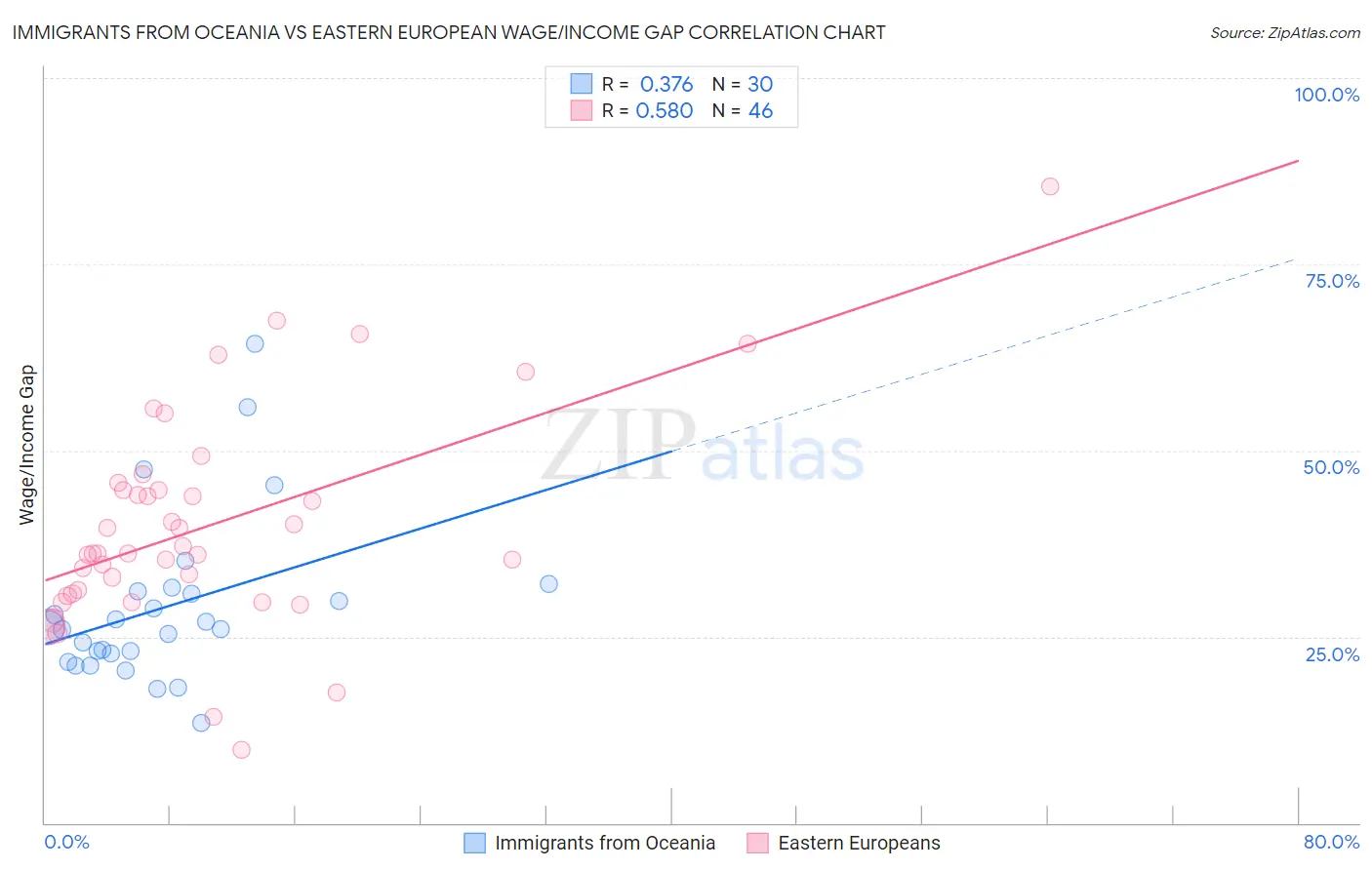Immigrants from Oceania vs Eastern European Wage/Income Gap
COMPARE
Immigrants from Oceania
Eastern European
Wage/Income Gap
Wage/Income Gap Comparison
Immigrants from Oceania
Eastern Europeans
25.6%
WAGE/INCOME GAP
57.5/ 100
METRIC RATING
170th/ 347
METRIC RANK
28.6%
WAGE/INCOME GAP
0.1/ 100
METRIC RATING
312th/ 347
METRIC RANK
Immigrants from Oceania vs Eastern European Wage/Income Gap Correlation Chart
The statistical analysis conducted on geographies consisting of 305,340,706 people shows a mild positive correlation between the proportion of Immigrants from Oceania and wage/income gap percentage in the United States with a correlation coefficient (R) of 0.376 and weighted average of 25.6%. Similarly, the statistical analysis conducted on geographies consisting of 460,606,306 people shows a substantial positive correlation between the proportion of Eastern Europeans and wage/income gap percentage in the United States with a correlation coefficient (R) of 0.580 and weighted average of 28.6%, a difference of 11.7%.

Wage/Income Gap Correlation Summary
| Measurement | Immigrants from Oceania | Eastern European |
| Minimum | 13.4% | 9.9% |
| Maximum | 64.4% | 85.4% |
| Range | 50.9% | 75.6% |
| Mean | 29.0% | 39.9% |
| Median | 26.1% | 36.2% |
| Interquartile 25% (IQ1) | 22.7% | 30.7% |
| Interquartile 75% (IQ3) | 31.1% | 44.6% |
| Interquartile Range (IQR) | 8.4% | 13.9% |
| Standard Deviation (Sample) | 11.1% | 14.4% |
| Standard Deviation (Population) | 10.9% | 14.3% |
Similar Demographics by Wage/Income Gap
Demographics Similar to Immigrants from Oceania by Wage/Income Gap
In terms of wage/income gap, the demographic groups most similar to Immigrants from Oceania are Immigrants from Greece (25.7%, a difference of 0.060%), Peruvian (25.6%, a difference of 0.17%), Immigrants from Chile (25.7%, a difference of 0.28%), Immigrants from Belarus (25.7%, a difference of 0.31%), and Seminole (25.6%, a difference of 0.35%).
| Demographics | Rating | Rank | Wage/Income Gap |
| Native Hawaiians | 69.0 /100 | #163 | Good 25.4% |
| Koreans | 68.6 /100 | #164 | Good 25.4% |
| Immigrants | Hong Kong | 64.0 /100 | #165 | Good 25.5% |
| Immigrants | Ukraine | 63.8 /100 | #166 | Good 25.5% |
| Paiute | 62.9 /100 | #167 | Good 25.5% |
| Seminole | 62.6 /100 | #168 | Good 25.6% |
| Peruvians | 60.1 /100 | #169 | Good 25.6% |
| Immigrants | Oceania | 57.5 /100 | #170 | Average 25.6% |
| Immigrants | Greece | 56.6 /100 | #171 | Average 25.7% |
| Immigrants | Chile | 53.2 /100 | #172 | Average 25.7% |
| Immigrants | Belarus | 52.9 /100 | #173 | Average 25.7% |
| Alaskan Athabascans | 50.0 /100 | #174 | Average 25.8% |
| Sri Lankans | 47.0 /100 | #175 | Average 25.8% |
| Paraguayans | 46.7 /100 | #176 | Average 25.8% |
| Cambodians | 45.1 /100 | #177 | Average 25.8% |
Demographics Similar to Eastern Europeans by Wage/Income Gap
In terms of wage/income gap, the demographic groups most similar to Eastern Europeans are Immigrants from Lithuania (28.6%, a difference of 0.13%), French (28.7%, a difference of 0.13%), Finnish (28.6%, a difference of 0.20%), Immigrants from Scotland (28.7%, a difference of 0.27%), and Macedonian (28.6%, a difference of 0.29%).
| Demographics | Rating | Rank | Wage/Income Gap |
| Immigrants | South Africa | 0.1 /100 | #305 | Tragic 28.5% |
| Whites/Caucasians | 0.1 /100 | #306 | Tragic 28.5% |
| Immigrants | Denmark | 0.1 /100 | #307 | Tragic 28.5% |
| Poles | 0.1 /100 | #308 | Tragic 28.5% |
| Macedonians | 0.1 /100 | #309 | Tragic 28.6% |
| Finns | 0.1 /100 | #310 | Tragic 28.6% |
| Immigrants | Lithuania | 0.1 /100 | #311 | Tragic 28.6% |
| Eastern Europeans | 0.1 /100 | #312 | Tragic 28.6% |
| French | 0.1 /100 | #313 | Tragic 28.7% |
| Immigrants | Scotland | 0.1 /100 | #314 | Tragic 28.7% |
| Maltese | 0.1 /100 | #315 | Tragic 28.7% |
| Lithuanians | 0.1 /100 | #316 | Tragic 28.7% |
| Belgians | 0.1 /100 | #317 | Tragic 28.8% |
| Basques | 0.1 /100 | #318 | Tragic 28.8% |
| Slovaks | 0.1 /100 | #319 | Tragic 28.9% |